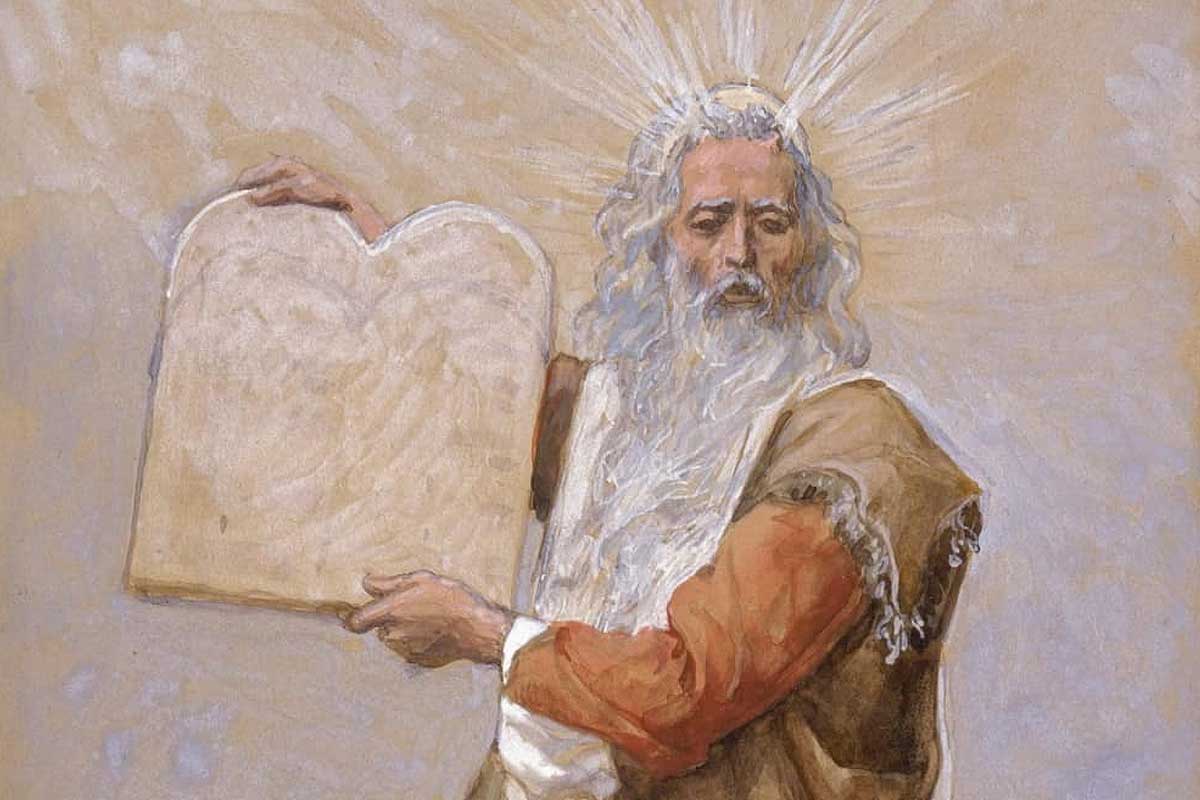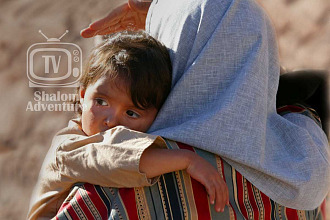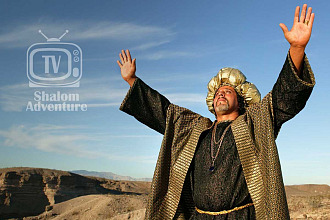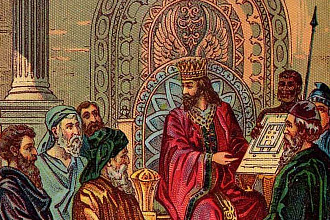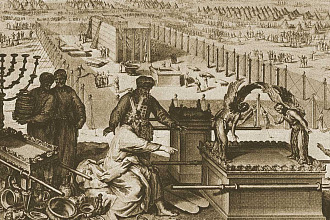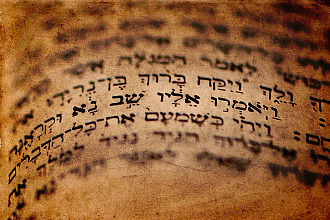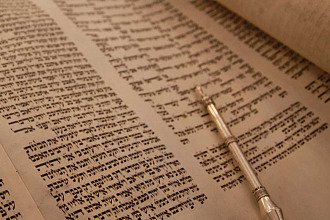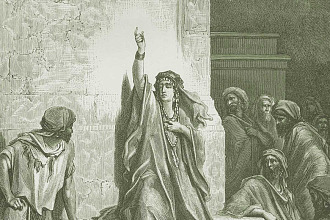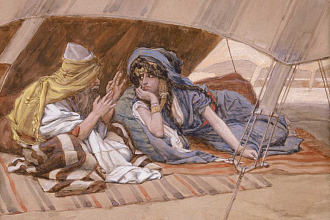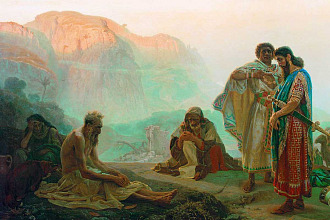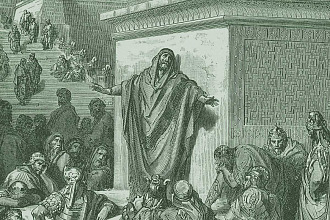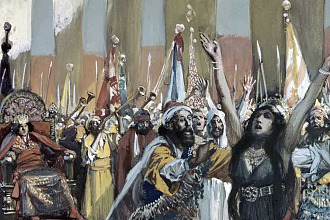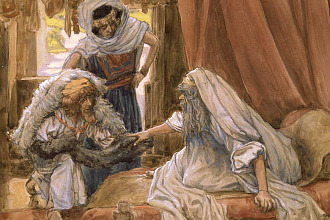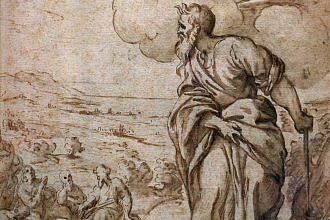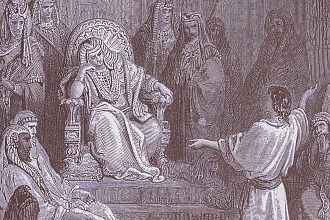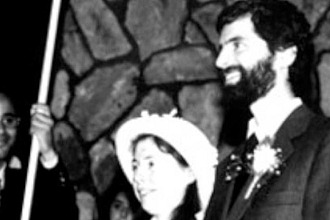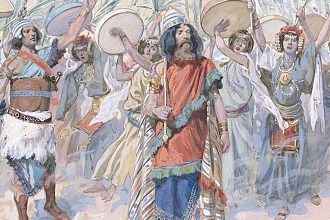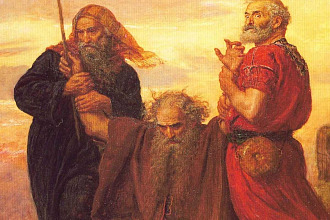When the children of Israel wandered in the wilderness they lived in tents. Today we have steel doors and bolt locks. Why is that? Well, you say, it’s because of the increase in crime.
But why the increase? Why is there so much crime? It seems that people are becoming criminals at increasingly younger ages.
We live in a society that is constantly changing its moral standards. People are wearing, saying, doing, hearing, and seeing things today that would have alarmed everyone ten or twenty years ago. Is this good, normal or natural? Is this God’s plan? What will society’s standards be for future generations? Does God have standards? Are these rules stable and everlasting? Do they transcend generations, cultures, races, and nationalities? Is there one law that allows us to be individuals, yet which will also bind us together, unifying us with Heaven’s plan?
When we talk about rules, some people get very uncomfortable. It’s a bit like taking your little sister to a party with you. Who wants to have someone looking over their shoulder to see if they’re doing anything wrong? What they forget is that only when there are rules – laws, if you please – is our community a safe place to live. As we study today we will discover that God’s finger wrote freedom. The greatest system of law in the history of the human race came through our people. We will see that God’s laws are not laws of restriction but of liberation. God is not watching over our shoulder to see if we are doing anything wrong, He is living within us empowering us to do it right.
One thing that uniquely established the Jewish nation in its beginning and has helped keep it unique is the fact that God Himself directly gave us His laws to follow, but they are not just for the Jewish people. Today we will see for ourselves what the Judge of all the earth considers right and wrong. We will find His loving, divine plan for our lives! We will also find out how these laws are really laws of love, designed to benefit us.
1. How did King David feel about God’s Torah?
Happy are those who observe His decrees, who turn to Him wholeheartedly... Would that my ways were firm in keeping Your laws; then I would not be ashamed when I regard all Your commandments... I have turned to You with all my heart; do not let me stray from Your commandments... Blessed are You, O LORD; train me in Your laws... I eagerly pursue Your commandments, You broaden my understanding. Teach me, O LORD, the way of Your laws; I will observe them to the utmost... Lead me in the path of Your commandments, for that is my concern... I will delight in Your commandments, which I love... Your laws are a source of strength to me wherever I may dwell. Psalm 119:2, 5, 6, 10, 12, 32, 33, 35, 47, and 54
Did you notice the words King David used regarding God’s law, His Torah, showing how he felt about it and how it made him feel? King David used terms such as; eagerly pursue, teach me, lead me, happy, delight, love, source of strength. Are these the terms you have usually thought of when you have thought of God’s law, His Torah? If not maybe we need to re-look and re-think about God’s Torah.
2. What were some of the other many things King David said about God’s teachings and instructions?
The teaching of the Lord is perfect, renewing life; the decrees of the Lord are enduring, making the simple wise; The precepts of the Lord are just, rejoicing the heart; the instruction of the Lord is lucid, making the eyes light up. The fear of the Lord is pure, abiding forever; the judgments of the Lord are true, righteous altogether, more desirable than gold, than much fine gold; sweeter than honey, than drippings of the comb. Psalm 19:8-10
3. How did Moses feel about the commandments of the Lord our God?
Observe them faithfully, for that will be proof of your wisdom and discernment to other peoples, who on hearing of all these laws will say, “Surely, that great nation is a wise and discerning people.” For what great nation is there that has a god so close at hand as is the Lord our God whenever we call upon Him? Or what great nation has laws and rules as perfect as all this Teaching that I set before you this day? Deuteronomy 4:6-8
How different that is than the way our society today usually feels about rules and laws. We usually think of laws and rules as restricting annoyances. But both King David and Moses saw them as sources of wisdom, and discernment, more desirable than gold and sweeter than honey. These men referred to them as the cause of rejoicing and renewing. They felt the laws of God were perfect righteous, pure and would make them the envy of other nations. We would be better off if we had there outlook towards God’s laws, teachings, rules, and instructions. As you read this lesson pray that God gives you a godly outlook towards God’s word as David and Moses had.
4. Written in the Torah are the Ten Commandments. Who wrote the Ten Commandments? On what did He write them, showing their everlasting validity?
The Lord spoke to you out of the fire…He declared to you the covenant that He commanded you to observe, the Ten Commandments; and He inscribed them on two tablets of stone. Deuteronomy. 4: 12, 13
God Himself wrote the Ten Commandments. That point cannot be over-emphasized. These are the only words in all the Torah that God wrote Himself. There are only four other words in all the Bible that God Himself wrote. (Those four words will be covered in Lesson 16). These commandments must be very special and important if God felt He needed to write them Himself. Not only are they so important that He wrote them Himself, they are so important that He wrote them in stone. Sometimes, when an agreement is not binding people will say “well, it’s not written in stone.” God’s Ten Commandments were written in stone; they are binding, they are eternal. What God writes does not change because God does not change. “For I am the LORD—I have not changed…” (Malachi 3:6). It is popular today to abbreviate God’s Ten Commandments, but Moses warned us “You shall not add anything to what I command you or take anything away from it, but keep the commandments of the LORD your God that I enjoin upon you.” Deut. 4:2
Many people today say they believe in the Ten Commandments, yet most do not know what they are, nor are they following all ten of them. How can we say we believe in something we do not know or do not follow? Do you believe in God’s Ten Commandments? Can you quote all ten of them fully, unabbreviated? Are you now following all ten? If you answered no to either of these questions I strongly encourage you to read each one carefully. Ask God to forgive you for where you have fallen short, and ask God to write His laws on your heart and mind, and empower you to follow them.
5. What are these 10 commandments that God felt were so important that He wrote them with His own finger in stone?
God spoke all these words, saying:
1. I the LORD am your God who brought you out of the land of Egypt, the house of bondage: You shall have no other gods besides Me.
2. You shall not make for yourself a sculptured image, or any likeness of what is in the heavens above, or on the earth below, or in the waters under the earth. You shall not bow down to them or serve them. For I the LORD your God am an impassioned God, visiting the guilt of the parents upon the children, upon the third and upon the fourth generations of those who reject Me, but showing kindness to the thousandth generation of those who love Me and keep My commandments.
3. You shall not swear falsely by the name of the LORD your God; for the LORD will not clear one who swears falsely by His name.
4. Remember the Sabbath day and keep it holy. Six days you shall labor and do all your work, but the Seventh Day is a Sabbath of the LORD your God: you shall not do any work—you, your son or daughter, your male or female slave, or your cattle, or the stranger who is within your settlements. For in six days the LORD made heaven and earth and sea, and all that is in them, and He rested on the Seventh Day; therefore the LORD blessed the Sabbath day and hallowed it.
5. Honor your father and your mother, that you may long endure on the land that the LORD your God is assigning to you.
6. You shall not murder.
7. You shall not commit adultery.
8. You shall not steal.
9. You shall not bear false witness against your neighbor.
10. You shall not covet your neighbor’s house: you shall not covet your neighbor’s wife, or his male or female slave, or his ox or his ass, or anything that is your neighbor’s…When He finished speaking with him on Mount Sinai, He gave Moses the two tablets of the Pact, stone tablets inscribed with the finger of God. Exodus 20:1-14; 31:18
6. In which one of these loving laws did God specifically use the word remember?
Remember the Sabbath day and keep it holy. Exodus 20:8
Of all ten of the commandments this is the only one in which God specifically used the word “Remember.” Maybe it is because it is the one God knew many people would forget.
7. Which day did God give us as the Sabbath day for us to enjoy?
Six days you shall labor and do all your work, but the seventh day is a Sabbath of the Lord your God. Exodus 20:10
God was specific. He did not say any one day in seven. He wrote, in stone, “the seventh day.” God says what He means and means what He says. Do you believe that?
8. What privileges does God give us with His Sabbath day?
Keep it holy... you shall not do any work—you, your son or daughter, your male or female slave, or your cattle, or the stranger who is within your settlements. Exodus 20:10
What a wonderful God! He gives us fifty-two vacation days a year! Some people think keeping God’s Sabbath is a burden or work. It is just the opposite—it is rest. How hard is it to rest?
9. Why did God choose the seventh day as the special day for us to delight in with Him?
For in six days the LORD made heaven and earth and sea, and all that is in them, and He rested on the seventh day; therefore the LORD blessed the sabbath day and hallowed it. Exodus 20:11
More than any other commandment, the Sabbath commandment tells us why He has a right to be our Lord. It is because He is the Creator. He made us and He knows what is best for us. Like a loving parent He cares for us. Notice that God rested on the Sabbath. It was not because He needed to rest; it was because He wanted to stop what He was doing and spend time with us. What a loving God! That is what the Sabbath is all about, resting in God’s love, spending time with Him. It is also a great time to spend enjoying God’s love with other people.
10. What did God specifically do regarding the seventh day, which He did not do to any other day of the week?
And God blessed the seventh day and declared it holy, because on it God ceased from all the work of creation that He had done. Gen 2:3
The seventh day of the week is the only day in the entire Bible that God blessed and made holy. There is a special blessing in keeping the seventh day holy. Sabbath is not a burden; it is a blessing.
11. When does God’s wonderful Sabbath day begin and end?
All the days of creation start in the evening (see Genesis 1:5-2:3 “it was evening and morning…”). Friday sunset ends the 6th day of the week, the Sabbath begins at sunset Friday evening and continues until sunset Saturday evening.
From the beginning God’s Sabbath has been from Friday evening until Saturday evening. God does not change and neither does His Sabbath. (The history of how it has come about that some people worship God on Sunday will be covered in Lesson 17.)
12. According to King Solomon who gets to benefit from God’s commandments?
The sum of the matter, when all is said and done: Revere God and observe His commandments! For this applies to all mankind: Ecclesiastes 12:13
What a wonderful God! Not only does He want Jewish people to benefit from His loving laws and mitzvot, He wants all mankind to benefit as well.
God wrote the Ten Commandments on stone for Moses to carry down to the people. But in principle they were in existence from the beginning, in the Garden of Eden. (There was no stealing, killing, coveting, etc. allowed in the Garden of Eden. The Sabbath was also established in the Garden.) The Ten Commandments applied to the parents of mankind in the Garden of Eden and thus apply to all mankind throughout eternity. God never intended for the Jewish people to be the only ones to benefit from His loving, guiding, laws. He wants everyone to be able to benefit from His gift to humanity.
13. How long do we get to profit from God’s magnificent Ten Commandments?
For as the new heaven and the new earth which I will make shall endure by My will—declares the LORD—so shall your seed and your name endure... and Sabbath after Sabbath, all flesh shall come to worship Me. Isaiah 66:22,23
Even in Heaven we will be enjoying God’s Sabbath. Of course we will not be killing, stealing, coveting, and lying, etc. in Heaven either. God’s Ten Commandments are a package, they are one unit. They are ten individual laws but they are really one law, the law of love. As one author put it “if you have broken one you have broken them all.” They can also be summarized in two parts. One part demonstrates our love for God and the other demonstrates our love for others. Keeping the first four commandments is a manifestation of loving God with all our heart, with all our soul, and with all our heart. Keeping the last six commandments is a manifestation of loving our neighbor as ourselves. If we love our neighbor as ourselves we will not kill them, steal from them, covet their stuff, or lie to them. If we love God with all our heart, soul, mind, and strength we will not use His name in vain, put other gods or things before Him, and we will rest with Him on His day of rest. Basically God’s one law of love can be subdivided into two categories with a total of ten applications. The rest of the Bible then takes those ten applications and demonstrates how they apply to human life.
14. According to King David how many of us have transgressed against God, how many of us have broken His law?
All have turned bad, altogether foul; there is none who does good, not even one. Psalm 14:3
No matter how good we are, we have all fallen short of God’s ideal. We have all made mistakes and sinned. But there is hope.
15. Then what should you and I do when we come to realize we have broken one of God’s laws?
Then I acknowledged my sin to You; I did not cover up my guilt; I resolved, “I will confess my transgressions to the LORD,” and You forgave the guilt of my sin. Psalm 32:5
The first step is knowing God loves you. The second step is confessing where you have fallen short of His ideal for you.
16. In addition to the confession, what is needed to remove the guilt of your sins?
If any person...unwittingly incurs guilt by doing any of the things which by the LORD’s commandments ought not to be done, and he realizes his guilt—or the sin of which he is guilty is brought to his knowledge—he shall bring a female goat without blemish as his offering for the sin of which he is guilty. He shall lay his hand upon the head of the sin offering, and the sin offering shall be slaughtered at the place of the burnt offering. The priest shall take with his finger some of its blood and put it on the horns of the altar of burnt offering; and all the rest of its blood he shall pour out at the base of the altar... Thus the priest shall make expiation for him, and he shall be forgiven. Leviticus 4:27-31
From the beginning a blood sacrifice was required for the forgiveness of sins. This demonstrated how awful sin is in God’s sight. As wonderful as God’s law is, it cannot cleanse us from sin. Its purpose is to teach us right from wrong. It is a mirror showing us that we need cleansing. The mirror cannot cleanse; it can only reveal dirt. As the mirror reveals the dirt on our skin it sends us to the soap and water to be cleansed. The same is true with the law. It reveals where we have sinned, which causes us to run to God for cleansing. (Review lesson 5 for more on this topic)
17. Who is it that willingly became our sacrificial offering, dying for our sins, and granting us forgiveness?
Our compassionate Messiah Y’shua. (See Isaiah 53 and Lessons 4-6.)
Sin is so horrible it requires a blood sacrifice. But our God is so loving that He provided Himself as the blood sacrifice. He Himself has taken responsibility for the sin problem even though it was not his fault.
18. Do we have the power by ourselves to just start doing what is right?
Who can say, “I have cleansed my heart, I am purged of my sin?” “Can the Ethiopian change his skin, Or the leopard his spots? Just as much can you do good, Who are practiced in doing evil!”Proverbs 20:9; Jeremiah 13:23
In our own power and strength we cannot change our ways or keep God’s laws.
19. After confessing our sin and accepting the Messiah’s death for the forgiveness of our sin, how can God give us the power to keep from sinning in the future?
Fashion a pure heart for me, O God; create in me a steadfast spirit. Do not cast me out of Your presence, or take Your holy spirit away from me. Let me again rejoice in Your help; let a vigorous spirit sustain me...
I will give you a new heart and put a new spirit into you: I will remove the heart of stone from your body and give you a heart of flesh; and I will put My spirit into you. Thus I will cause you to follow My laws and faithfully to observe My rules. Psalm 51:12-14; Ezekiel 36:26, 27
It is God who re-creates us. He comes inside us and changes us. He enables us to follow His laws. What a loving God! He gives us His laws for our benefit, He forgives us for where we have fallen short, and then He gives us the power not to make the same mistake again. That forgiveness and that power to overcome are ours for the asking. Why not stop right now and ask God to cleanse you from all past sins and ask Him to give you His Spirit to empower you to faithfully observe His rules?
20. Now with God’s Spirit working from within you, what will be the results? How will you view His Torah?
Those who love Your teaching enjoy well being... O LORD; I observe Your commandments...and love them greatly. Psalm 119:165-168
King David greatly loved God’s commandments. When we have God’s Spirit living in us we will greatly love God’s Torah too.
21. How often should we ask for God’s Spirit?
...I call to You, O LORD, each day; I stretch out my hands to You. Psalm 88:10
What we have learned here is not a once-for-all-time lesson, but something that we must experience each day.
Consider now, that God’s 10 commandments are more His responsibility to keep than ours. It is His Spirit that must keep them through us. If we will only allow Him to cleanse us of the sinful habits that keep us from following Him and allow Him to come into our lives and work in us and through us, He will empower us to keep His laws. Look at them as God’s 10 promises or guarantees to you and me. Say to God, “You promised me that I will not kill, so take this anger out of my heart and give me love and forgiveness.” “You promised me that I would keep the Sabbath day holy, so help me find a job where I can have Sabbaths off.” They are God’s commandments, promises, guarantees, so hold Him to them! They are for you to enjoy and benefit from. God loves you.
The Torah is filled with many more wonderful lessons for us to learn and experience, including how we can be healthier and stronger. Fill out your review sheet right now so you can find out what other gifts God has for you in your next lesson entitled Moses the Torah writer.
This lesson is adapted from "Jewish Discoveries," by Jeff Zaremsky, to buy the printed book, click here.

